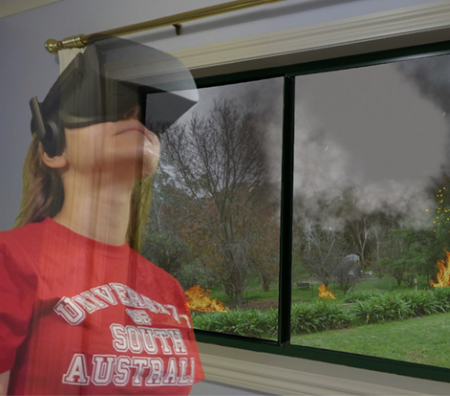Chief Investigators: Dr Safa Molan and Professor Delene Weber
Project Duration: 2015 to 2021
Problem
One-third of all bushfire fatalities in the last 100 years has been due to late evacuation. Despite impressive efforts by the SA Country Fire Service to improve bushfire preparation, people are still not doing so sufficiently and are often unsure as to what they should do in bushfire situation. The preparedness of people under 35 is particularly problematic. Our project places people in a realistic fire situation within the safe realm of immersive virtual reality (VR). We designed this innovative approach to engage a wide diversity of people, provide them with valuable skills and knowledge, and prompt them to create a written bushfire survival plan.
Project Summary including how the problem was solved
Prior to the VR experience, most participants (55%) suggested they would ‘wait and see’ rather than take a decisive action if the fire danger rating was severe. We noticed significant differences based on gender in physical and emotional preparation amongst the ‘wait and see’ cohort.
After experiencing the VR scenario, almost one-third of respondents developed a Bushfire Survival Plan (BSP), and more than three-quarters of respondents could remember key safety tips 3 months after the experience. Our project indicates that VR has potential to decrease time consumed in denial and deliberation during a fire incident and encourage more rapid decisive action.
Impact
We have published several academic reports and have three more publications coming out soon.
Our Facing Fire project is the first to apply an interactive VR scenario to educate the public about bushfire preparedness. The project has been featured on national news (channels 7, 9 and the ABC) and in a wide variety of other channels. We provide strong evidence of the great potential of VR to act as a catalyst to engage people in fire planning and improve their learning retention related to fire safety.




